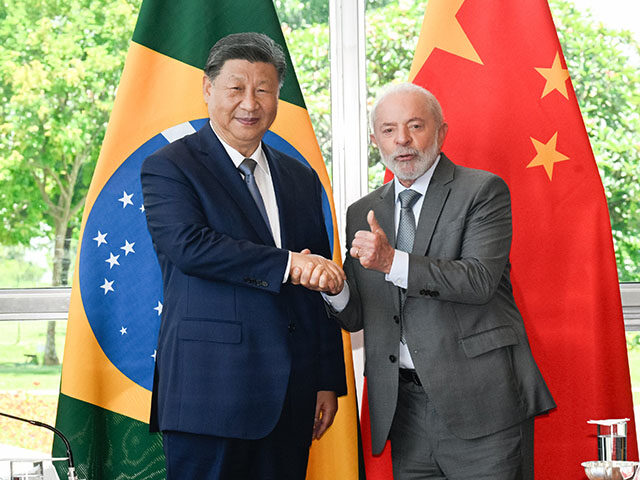Genocidal Chinese dictator Xi Jinping held extensive, fruitful meetings with socialist Brazilian President Luiz Inácio Lula da Silva on Wednesday that concluded with the countries agreeing to elevate their diplomatic ties to that of “Community for a Shared Brazil-China Future for a More Just World and More Sustainable Planet.”
That elevation consisted in part of the signing of 37 different agreements, the Brazilian newspaper O Globo reported, that span “agricultural products, educational exchange, and technological cooperation in areas such as trade, investments, infrastructure, industry, energy, mining, finance, communications, sustainable development, tourism, sports, health, and culture.”
The two leaders agreed to expand the scope of their cooperation as part of China’s Belt and Road Initiative (BRI), a global infrastructure plan in which China offers predatory loans to poor countries to be used to fund cost-prohibitive infrastructure projects. When the countries cannot pay the loans back, China uses the opportunity to seize the projects themselves or otherwise compromise the sovereignty of the country in question, as has happened to Sri Lanka and Zambia. Some reports indicate China also exploits BRI projects to gather intelligence in targeted countries.
Lula, a radical leftist, has invested heavily in expanding China’s influence in his country since his first term in office began in 2003. In addition to joining the BRI, Lula helped found the BRICS coalition, an anti-American group initially consisting of China and Brazil alongside Russia, India, and South Africa. Lula served his first two terms from 2003 to 2011 and was repeatedly convicted on corruption charges related to a massive infrastructure fraud scheme known as “Operation Car Wash.” He won the 2022 presidential election after Brazil’s top court overturned his prison sentences on procedural grounds.
“Chinese companies have been bidding for infrastructure projects and have been partners in ventures such as the construction of hydroelectric installations and railroads. This means jobs, income and sustainability for Brazil,” Lula declared in a speech alongside Xi on Wednesday. “Brazilian industries are also expanding their presence in China, such as WEG, Suzano and Randon. At the same time, agribusiness continues to ensure Chinese food security. Since 2017, Brazil has been China’s largest food supplier.”
Xi declared the relationship between Brazil and China to be “at the best in its history” and celebrated the two countries for making “outstanding contributions to world peace and stability.” In reality, Beijing is a primary enabler of some of the most nefarious rogue regimes in the world, including Iran, North Korea, and Cuba, while Brazil under Lula has vocally opposed sanctions and other actions against Russia for its invasion of Ukraine.
Brazil and China have united to pressure Ukraine to accept terms favorable to Russia in exchange for ending the invasion, which Lula celebrated in his remarks.
“China and Brazil prioritize peace, diplomacy, and dialogue. Our common understanding of the Ukraine crisis is an example of our convergence on international security matters,” he said.
Xi chose to emphasize the expansion of the BRI and Brazil’s support for China’s “core interests,” typically including China’s false claims to the nation of Taiwan as a renegade province.
“Xi called on the two sides to firmly support each other on issues concerning core interests such as sovereignty, security and territorial integrity,” the state-run Global Times reported, “be strategic partners of mutual trust and set a good example of solidarity, cooperation, mutual benefit and common development for countries in the Global South.”
The “Global South” is a term typically used to mean the world’s poor and developing countries; China includes itself as a leader of the “Global South” despite being the world’s second-largest economy and being located in the Northern Hemisphere.
The provisions of the official declaration on elevating bilateral ties indeed mentions China’s false claims to Taiwan.
“The Brazilian side reiterated that it firmly adheres to the One China principle, recognized that there is only one China in the world and that Taiwan is an inseparable part of Chinese territory,” the text read, “while the Government of the People’s Republic of China is the only legal government representing all of China.”
“Brazil supports China’s efforts to achieve peaceful national reunification. The Chinese side expressed great appreciation in this regard,” it added.
The declaration also listed “finance, infrastructure, supply chain development, investments, ecological transformation, science, and technology and innovation” as areas of cooperation.
Xi is currently concluding a South America tour that began in Peru, where he helped inaugurate an incomplete deep-water port alongside President Dina Boluarte and attended the annual support of the Asia-Pacific Economic Cooperation (APEC) group. He then traveled to Rio de Janeiro to attend the G20 summit and concluded his trip with a stop in Brasilia for the official state visit to Brazil.
The Chinese dictator was a dominant presence at both the APEC summit and the G20, particularly in the absence of any meaningful American leadership. Outgoing President Joe Biden attended both summits but made little impact and appeared to be routinely ignored or sidelined by the other participants. The G20 was nonetheless the site of significant discord, reports on the ground indicated, as many countries’ diplomats navigated apprehension about the return of President-elect Donald Trump to the White House. The ultimate joint statement from the summit avoided specific promises on many critical issues, opting instead to generally call for an end to hunger and war.

COMMENTS
Please let us know if you're having issues with commenting.